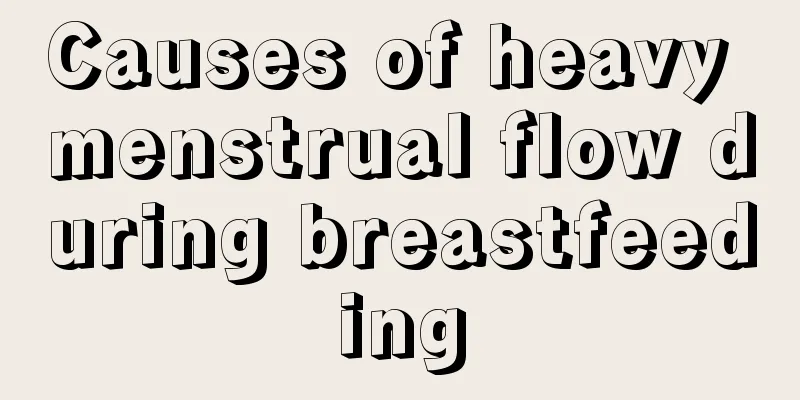Causes of heavy menstrual flow during breastfeeding

|
During the breastfeeding period, the mother will supplement a lot of nutrition, but if the nutrition is too much, it will also be harmful. During menstruation, due to overnutrition, it will cause heavy menstrual flow. You should take some medicine to recover. If the situation is serious, you should go to the hospital in time to do some relevant examinations to avoid intermittent bleeding. You must live a regular life, don't stay up late, and relax. Let’s take a look at the specific reasons below. 1. For new mothers, they have to breastfeed after giving birth, so some mothers may not have menstruation for a long time. Many people will return to normal within half a year after giving birth, while some people may even need more than a year to have menstruation. However, if you have menstruation after giving birth but suddenly stop having menstruation, then it means that there is a problem with your body, which may be caused by endocrine disorders. Therefore, as a patient, you must go to the hospital for relevant examinations. Only after the examination and symptomatic treatment can your menstruation return to normal. 2. Many women experience menstruation within a short period of time after giving birth. In this case, you are still able to get pregnant again. If you have sex without taking relevant measures at this time, it is very likely to lead to pregnancy again. This is very harmful to the majority of female friends, because many women's bodies have not recovered. Therefore, it is recommended that you do relevant contraceptive work during breastfeeding. From a medical point of view, based on the tissue morphology of the endometrium, the ovaries may be able to ovulate as early as 33-42 days after delivery. Research data show that 40% of non-breastfeeding mothers resume ovulation 6 weeks after delivery; by 8-12 weeks after delivery, only about 35% of mothers have not resumed ovulation and menstruation. About 25% of breastfeeding mothers will resume ovulation and menstruation 12 weeks after delivery, and most breastfeeding mothers usually take until 18 weeks to fully resume ovulation function. However, it is sometimes difficult to clinically determine the exact time of the first menstrual period after delivery, and a small number of women will begin to have intermittent bleeding of small to moderate amounts immediately after delivery. |
<<: Menstruation suddenly stopped during breastfeeding
>>: What are the causes of cesarean section scar hyperplasia?
Recommend
What should I do if a pregnant woman catches a cold?
Colds have become a very common condition for man...
Do I need to check my thyroid gland during pregnancy?
Nowadays, having a child is not just a matter of ...
What toothpaste should I use for sensitive teeth? How to protect teeth?
In daily life, pay attention to protecting your t...
What should a girl do when she has her first menstrual period?
A woman’s first menstruation is generally called ...
The gestational sac has become smaller and the embryo has grown larger.
The gestational sac can only be seen in the early...
What is the difference between a bra and a bra? The similarities and differences between bras and brassieres
Whether it is a bra or a bra, I believe it is no ...
Height and weight standard for women
In today's society where thinness is consider...
What causes women to suddenly urinate urgently?
In life, many people have urinary urgency, and th...
Symptoms of pancreatic cancer before death
Pancreatic cancer is a highly malignant tumor tha...
Brown vaginal discharge after induced abortion
There are still many women who undergo induced ab...
How to look good with your hair down
Shoulder-length hair is a common hairstyle. For s...
Is the success rate of pregnancy induction high?
For a woman to successfully conceive, she must pr...
Dead skin after using the erosion suppository
Female friends are all relatively familiar with t...
How to prevent vaginal bleeding after childbirth
Postpartum vaginal bleeding usually occurs within...









